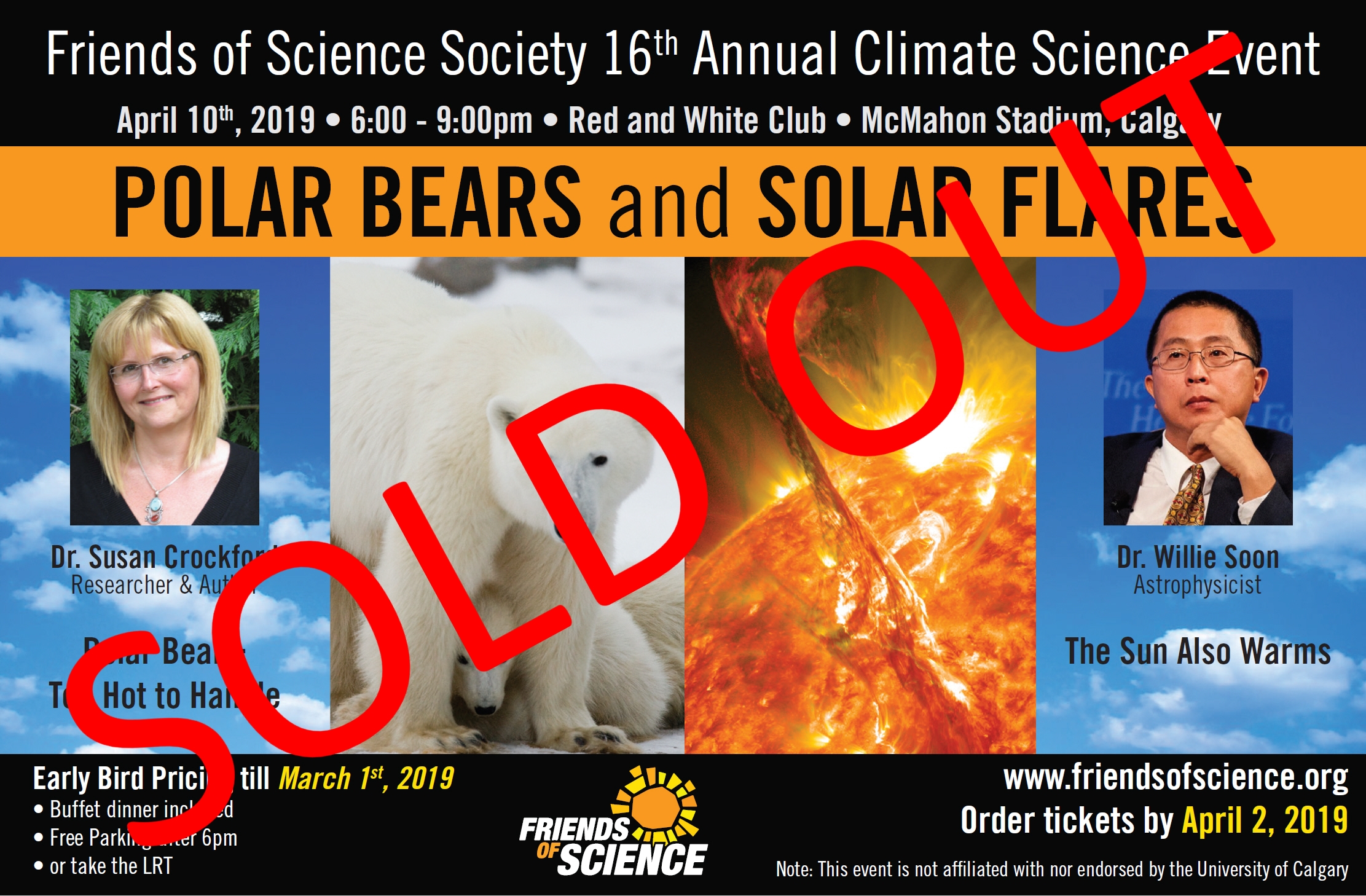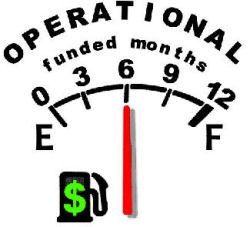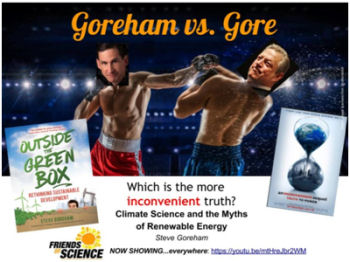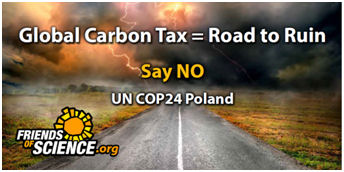
December 2018
FoS MEMBERSHIP QUARTERLY NEWSLETTER
No. 60
The PDF version of this newsletter is here.
FoS is dedicated to providing the public with insight into Climate Science
PRESIDENT 'S MESSAGE
Another year almost completed. Much has happened since our last newsletter. I am sure you are all aware of the little UN COP24 junket in Katowice Poland during the first two weeks of December. And did you know that almost 30,000 Anthropogenic Climate Changers descended on Katowice for their COP pilgrimage? A city of 300,000 is ill prepared to host an additional 10% tacked on to their population. This little party, of course, generated an estimated 55,000 tonne CO2 footprint. To put this in perspective needs some quick calculations. It turns out that during the event each attendee generated a footprint equivalent to 14.5 times the CO2 emissions of each Katowice resident. The organizers have promised to plant six million trees in Poland to balance these emissions. Planting trees is always good and those trees will help absorb CO2. But do you see what they are doing? These expert magicians misdirect you in thinking that the trees offset the pollution from their travels and event. They do an excellent job of continuing the brainwashing to vilify CO2. The real pollutants are of course carbon monoxide, sulphur oxides and nitrogen oxides. These emissions are completely forgotten as the organizers preach about how they are an entirely climate neutral conference. Really? Why not videoconference if you truly worry about polluting the environment? Or is it more about the opportunity to party and be able to grandstand the big climate lie?
We here at FoSS are extremely concerned that the non-binding Paris Accord will become binding by way of a Global Carbon Tax to be introduced at one of these conferences. The "carbon law" is promoted by several influential anthropogenic climate scientists and we have explained the risks in the COP24 Global Carbon Tax? video. Sure enough, Big Green has made it a climate action item now. Thus to get this message out to Canadians we ran a little billboard campaign in Calgary, Edmonton, Vancouver, Toronto and Montreal.
|
|
|
|
|
|
We have also been very busy organizing our spring 2019 Dinner event for April 10th, 2019. We are hosting Dr. Susan Crockford, a Canadian zoologist specializing in polar bears, and Dr. Willie Soon, a researcher at the Solar and Stellar Physics Division of the Harvard ‘Smithsonian Center for Astrophysics. Please save the date for a fun educational evening (6 to 9 pm) at the Red and White Club at McMahon Stadium in Calgary. |
 |
||
|
Early Bird priced tickets will be on sale in the new year. |
|||
Our blog contributors have added 50 new postings since our last newsletter. As well we added 27 new videos on YouTube. We have new reports, Faulty Premises = Poor Public Policy on Climate where we respond to the IPCC Special Report SR15 and IN THE DARK ON RENEWABLES that rebuts Deloitte and Climate Reality 's claims that wind and solar are as cheap and reliable as conventional fossil fuel fired power generation. Last but not least you can always find more on our Facebook page.
Sadly, political leaders and NGOs keep conflating extreme weather events with carbon dioxide. Our spring event video with Dr. Khandekar is posted online and he discusses extreme weather events, disproving the claim that they are related to human influence or carbon dioxide levels. You can find Dr. Khandekar 's PowerPoint here. Our leaders and the NGOs should be promoting safety and adaptation programs for us to deal with extreme weather, instead of pushing Carbon Taxes that do nothing to mitigate anything Mother Nature may throw at us. The media don 't report the truth that extreme weather has nothing to do with human input because they want to create a juicy blame story: If it bleeds, it leads .
Marijn Poels, who was one of our 2018 speakers, has just released a new film entitled Paradogma which just won Best Independent Documentary Film at the Paris Film Festival. A short blog post about it can be found here. For those of you who missed the screening of Marijn Poel 's film The Uncertainty Has Settled, it is now available for FREE screening on Vimeo. Make sure you select your language preference before you start.
At Friends of Science Society we pride ourselves as being one of the few organizations that calls out the activists and connects the dots in terms of funding and influence, as you can see here:
2018-11-28 An open letter to the Intergovernmental Panel on Climate Change
2018-12-17 An open letter to Canadian Senators on Bill C-69
2018-12-17 An Open Letter to Whistler and CNRL on Climate Costs Shakedown
In closing I want to wish all of you a very merry Christmas and a fantastic New Year from all of us at FoSS.
POLITICAL DEVELOPMENTS
COP24 in Katowice
This year 's climate summit took place December 3 to 15 in Katowice, Poland, located in the heart of the country 's Upper Silesia coal-mining region. For the occasion Poland named one of its leading coal companies (JastrzÄ™bska Sp ³š‚ka WÄ™glowa, a majority state-owned corporation and the EU's largest producer of high-quality coking coal) as the first official sponsor of the conference. Poland also called for solidarity with industrial workers, delivering a clear message that climate change must be tackled, but not at the expense of coal workers. Poland wasn 't alone in pitching coal at COP24; the US delegation put on an event supporting fossil fuels that upset the audience. Also sending a bad signal as the talks began was France 's fuel-tax retreat in the face of the gilets jaunes anti-government protests.
Before the conference started, Brazil, which was supposed to host COP25 next year, withdrew its offer, with its new government citing the need to save money. This left the UN scrambling to find a new venue in South America, finally settling on Chile (November 11-22, 2019) with a pre-COP meeting in Costa Rica.
There were around 14,000 delegates registered for the conference. Two African countries sent the most, led by Guinea (406) and Democratic Republic of Congo (237). Poland was No. 3 (211). Canada was No. 13 (126) while the US sent only 44.
Climate Change News published a glossary of 32 technical terms that they thought were important in Katowice, and CFACT explains how this climate summit language reveals a hidden agenda. The largest group of terms in the glossary refers to the various political alliances for the design of the new world order. The biggest group is G77+China (actually G134+China). These are the countries that stand to benefit the most from the new world order, through payments from developed nations. Africa has its own group, as they stand to make more money per capita than any other region. The next largest group of terms deals with wealth transfer, specifically the $100 billion/year promised in Paris, and this is at the core of the new world order, for which the climate scare is the UN 's lever for action.
The main object of COP24 was to settle the Paris Agreement rulebook , needed to make the agreement work. These rules include how to articulate and track national climate pledges; how to help other countries reduce their emissions; how to communicate national efforts to adapt to climate change; how to report on finance for climate action; how to equip developing countries with technology to combat climate change, and how to make reporting actions more transparent.
On December 8 a floor fight developed over accepting the IPCC 's special report of last October on the impacts of a 1.5 °C temperature rise. This report was commissioned during COP21 in Paris specifically to spur action at COP24. Delegates were shocked when the US, Saudi Arabia, Russia and Kuwait objected to COP24 welcoming the report (and thus its conclusions), preferring the lukewarm phrase take note instead. In the end the final 133-page COP24 decision text welcomed the report 's timely completion and invited countries to make use of it.
As usual this COP ended one day later than scheduled at around 22:00 on Saturday December 15. Carbon Brief prepared a summary of the final text as shown in the following table.
|
Topic |
Outcome |
|
Climate pledge guidance |
All countries shall use the IPCC 's latest accounting guidance (last updated in 2006, but due to be refreshed in 2019) to report their promised and actual emissions reductions, known in UN-speak as nationally determined contributions (NDCs). The pledges will be recorded in a public registry. |
|
Market mechanisms |
This was supposed to deal with countries trading their overachievements on climate pledges, specifically to avoid double counting of emissions reductions. However, Brazil, as holder of many of the old trading permits, refused to back down, so this issue remains unresolved and was deferred to 2019. |
|
Climate finance reporting |
Countries are allowed to report the full value of loans as climate finance. Developed countries are to report projects for future climate finance as available from 2020, and the money does not have to come from new funding schemes. The collective goal of $100 billion/year in new funding remains essentially meaningless. |
|
Transparency |
The US and the EU prevailed, so there is now a single set of rules for developed and developing countries. However, this set allows for flexibility for those developing country parties that need it in the light of their capacities, language taken from the Paris Agreement itself. |
|
Global stocktake |
Under the Agreement, there is a five-year, pledge-and-review cycle, and the first of these is to take place in 2020, when countries are to re-submit or update their NDCs that should represent a progression on their previous ones. |
While delegates at COP24 did eventually agree on the rulebook, they did not deal with the elephant in the room that current pledges under the Paris Agreement are well below what 's called for in the IPCC 's special report. Or, as Politico.eu puts it: Governments talk a good game, but balk when it comes to making painful cuts that could upset voters. For example, before leaving for Katowice Canada 's Environment and Climate Change Minister, Catherine McKenna stated that Canada will have tougher emission-cutting plans for the 2020 round of pledges, though she has been reluctant to announce them when the country 's current plan is insufficient. At the end of the conference Climate Action Network Canada expressed disappointment that the minister didn 't use COP24 to announce Canada 's 2020 pledge early, as other countries have done.
For its part the UN will hold a Climate Summit 2019 on September 23 in New York, for which the Secretary-General wants world leaders to bring bold announcements and actions one year ahead of the 2020 pledge deadline. Given that next September will be just before the federal election, where carbon taxes are going to be an issue, don 't expect any bold climate announcement from Ottawa next year. As a way of putting off having to make any such announcement, Minister McKenna 's department is soliciting proposals for an arms-length external institute to advise the government on clean-growth and climate change. The deadline for proposals is next February 14, and the institute will have a $20 million budget over five years.
SCIENCE NEWS
IPCC Special Report on Limiting Temperatures to 1.5 °C
The Intergovernmental Panel on Climate Change (IPCC) published a special report (SR15) on the impacts of global warming of 1.5 °C above pre-industrial levels on October 8, 2018, in advance of the COP24 meeting in Katowice, Poland. Several governments objected to the report so it was not adopted at the COP24 meeting.
Dr. Ray Bates of the University College Dublin in Ireland wrote a comprehensive report that explains why there is great controversy about the report. Dr. Bates concludes that the report lacks scientific rigour. A summary of Dr. Bates ' report published by the Global Warming Policy Foundation lists three main points where the SR15 is deficient and overly alarmist.
- It departs from the IPCC 's Fifth Assessment Report in conveying an increased sense of planetary emergency without giving rigorous scientific reasons for doing so.
- It fails to communicate to policymakers a considerable body of important observationally-based research evidence that has accumulated since the Fifth Assessment which reduces the sense of a looming emergency.
- It fails to communicate important information made public by climate modellers since the Fifth Assessment regarding the empirical tuning of models to achieve desired results.
There is much recent observational and scientific evidence that the IPCC report has failed to include and which supports a more considered mitigation strategy than the extreme and unrealistic measures called for in the SR15 report, said Prof Bates.
Dr. Ray Bates is an eminent climate scientist. He was a senior scientist at NASA and was a professor of meteorology at the Niels Bohr Institute, Copenhagen, and is currently at University College Dublin. He recently published a paper which, using a detailed energy balance model, found that the equilibrium climate sensitivity (ECS) to a doubling of CO2 is tightly constrained with a best estimate of 1.02 °C and a likely range of 0.85 °C to 1.28 °C. In contrast, the last IPCC report estimated the ECS likely range at 1.5 to 4.5 °C. The high end of the IPCC estimate is likely 3.5 times too high. The FUND integrated assessment model calculates a social net benefit of about US$ 6/tCO2 in 2020 using Bates ' best estimate of ECS.
Friends of Science published a report which I authored about the economics of the SR15 report. The report shows that the median cost estimate of mitigating CO2 emissions in 2030 to meet the 1.5 °C target with no temperature over-shoot is about 880 US$/tCO2, but with an enormous range of 135 to 5500 $/tCO2. This cost is the equivalent carbon dioxide tax required, without any other climate policies to meet the target assuming on natural climate change. As temperatures have already increased by 1.0 °C above the pre-industrial levels according to the report, this allows only 0.5 °C of global average temperature rise above 2018 levels. SR15 estimates sea levels would be 10 cm lower in 2100 at the 1.5 °C target than at the 2 °C target, which is a tiny difference.
The benefits of meeting the target in 2030 according to SR15 is $15/tCO2 based on the DICE economic model. That model contains only insignificant benefits of CO2 fertilization and forecasts sea level rise far greater than IPCC estimates. The FUND economic model calculates there is a net benefit of emissions in 2030 of about US$8/tCO2 if ECS is 1 °C. Meeting the 1.5 °C target would cause radical and extremely costly changes to the world economy to prevent the net benefits of CO2 fertilization and a slightly warmer climate. Global temperature might decline in the future few decades with the cooling effects of ocean oscillations and declining solar activity.
Solar and Climate
The International Sunspot Number graph shows that we are near the solar minimum of the solar cycle. Correlations of solar activity and climate proxies indicate the solar activity has a major effect on climate, which is much larger than assumed by the IPCC. Dr. Nir Shaviv presented important evidence that solar activity is a major driver of climate change at a pre-COP24 meeting in Germany. His work shows that the rate of sea level rise correlates well with solar activity. It was argued at the meeting that since solar activity has been declining from about 1990 while global temperatures increased, the sun can 't be the cause of the warming. Shaviv explains, If you heat the system for a given duration, it takes time for the system to reach equilibrium. If the heating starts to decrease while the temperature is still below equilibrium, then the temperature will continue rising as the forcing starts to decrease. This is the reason for the so-called global warming hiatus . A model of the climate system that includes significant solar forcing and low climate sensitivity to greenhouse gas changes obtains a much better match to global temperatures than the climate models used by the IPCC. The climate models ' lower atmosphere temperature trend since 1979 is 215% of the temperature measurements from satellites. It is likely that the IPCC climate models forecast of the lower atmosphere temperatures will continue to diverge from the temperature measurements.
FUNDRAISING COMMITTEE: MEMBERSHIPS AND DONATIONS
 Our Operational funds fuel gauge on the right shows that we have six months of funding available for 2019.
Our Operational funds fuel gauge on the right shows that we have six months of funding available for 2019.
Unexpected Ontario Angels funded our last minute COP24 billboard campaign this year. The rest of the time we worked hard to get our message out through regular op-eds, press releases, our Blog, Facebook page and YouTube videos. In addition, our talented spokespeople, Michelle Stirling, Ken Gregory, and Ron Davison, spoke at conferences, private clubs and other events.
Our annual May event while successful in covering our costs does not make us money. The intent of this event is to inform rather than be a fund raiser. We try hard to keep our attendance price at a reasonable and affordable price so many can attend and our message can spread out to more people.
The Friends of Science does not represent any industry, or any political Party. We are a small group of volunteers with an operational budget that is a fraction of what governmental agencies, environmental groups and media use to disseminate fear-mongering information about human induced climate change. Since 2002 we have provided climate science and policy insights to the public and to policy-makers. Our founders saw climate science as a complex, interdisciplinary issue that was rapidly being reduced to a mantra around carbon dioxide and carbon taxes. Real problems related to environment and climate change were and continue to be ignored and lost in the rhetoric of Saving the Planet '. This rhetoric has been devastating industries and the economy, creating needless unemployment. Companies and businesses have been closing, or going on the auction block. Our commitment continues to be maintaining free delivery of our information to the public, which can only be made possible through your donations of time and money.
While all our Contributors and Directors volunteer time and knowledge, we do have the expense of our sub-contracted computer and website services, our exceptional Communications Manager, and our Office Manager, both who dedicate more time than we can possibly compensate. To maintain this amazing level of expertise, we need to continuously solicit donations. Every dollar we receive counts and is put towards the task of bringing the latest information to the public. This is not easy as we are continuously battling deep-pocketed and often foreign-funded activist groups that promote half-truths while creating faulty public policy. They would love to silence us.
We are in this together and we need your help. We appeal to you to please continue to make donations to Friends of Science. As we start 2019 we will face many forces wanting to stop our messages. With two elections in 2019, (Alberta and federal) climate change, carbon taxes and renewables are likely to be key topics with the most implications as you can well imagine. Remember, we are your voice for climate change issues and ask that you keep repeating our messages whenever and wherever you can. Please continue to share our materials by email, twitter, and Facebook or in any way you can.
This debate matters, you are making a difference.
You can also help us expand our pool of members and donors. If every person brought us five new people, it would make a huge difference to our ability to get out the message. Do you have a local Chamber of Commerce or service club? Invite one of our speakers or ask for one of our presentations and present it yourself (or perhaps do your own version if you feel up to it).
For us to make sure our voice is heard, we will need much more support - personal, financial, and through your networks of friends and colleagues. Thank you for all your help. We appreciate your continued support.
Contributions can be made at friendsofscience.org by clicking on Become a Member/DONATE in the upper right of the home page. The PayPal donation link will allow you to pay with your credit card even if you do not have a PayPal account. Should you experience technical difficulties with online processing, please try turning off any ad blocker as we have no ads anyways. Otherwise if you prefer, you may phone us at 1 ‘888 ‘789-9597 Ext 2 to pay by credit card. Alternately, you can mail donations to Friends of Science at the following address:
Friends of Science Society
|
BREAKING NEWS! Our Steve Goreham event video of 2017 has gone viral with close to 285,000 views as of Dec. 24, for reasons unknown to us. It may be that we were tweeting this amusing graphic of "Goreham vs Gore" with the link to POTUS and to COP24/UNFCCC - or people might just like Steve's style. We did receive many compliments on his presentation from event attendees. He seems to strike a good balance between scientific content and plain language... as he explains the implications of policy. If you are on twitter or Facebook or LinkedIn, please share Steve's video as much as you can! Please join in on our conversations when you can. |
 |
Check out our social media platforms:


